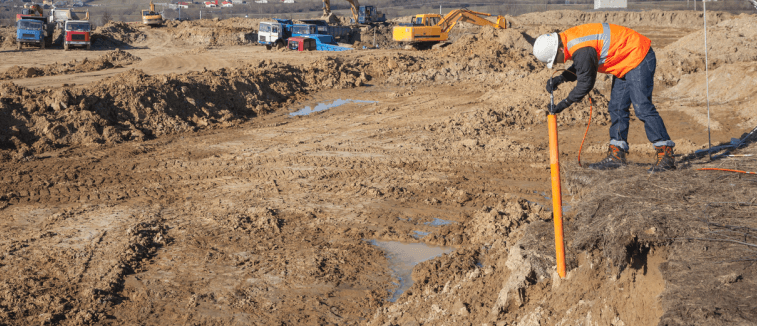Getting The Geotheta To Work
Getting The Geotheta To Work
Blog Article
The smart Trick of Geotheta That Nobody is Discussing
Table of ContentsThe Only Guide to GeothetaSome Known Incorrect Statements About Geotheta See This Report about GeothetaHow Geotheta can Save You Time, Stress, and Money.Not known Incorrect Statements About Geotheta

They conduct site investigations, accumulate examples, perform research laboratory examinations, and evaluate data to assess the viability of the ground for building jobs - Consulting Engineers. Based on their searchings for, geotechnical engineers give referrals for foundation style, incline stability, preserving structures, and reduction of geotechnical hazards. They collaborate with other specialists, such as architects, structural engineers, and building teams, to ensure that geotechnical factors to consider are integrated right into the general project design and implementation
By analyzing the habits and residential or commercial properties of soil and rock, they can determine possible geotechnical threats such as landslides, dirt negotiation, or incline instability. Their experience assists stop failures or mishaps that can jeopardize lives and building. Here are some thorough obligations and duties of a geotechnical engineer: Site Examination: Geotechnical engineers conduct website examinations to collect data on subsurface conditions.
They interpret the data to understand the properties and actions of the dirt and rock, including their stamina, leaks in the structure, compaction attributes, and groundwater problems. Geotechnical Evaluation and Layout: Geotechnical designers evaluate the data collected during website examinations to evaluate the stability and viability of the site for building and construction jobs. They perform geotechnical computations and modeling to assess factors such as birthing capability, settlement, slope security, side planet pressures, and groundwater circulation.
The Best Guide To Geotheta
Foundation Layout: Geotechnical engineers play a crucial role in creating foundations that can safely sustain the desired framework. They examine the dirt conditions and tons demands to determine the suitable foundation type, such as superficial structures (e.g., grounds), deep structures (e.g (https://flossy-rotate-3d1.notion.site/Why-Geotechnical-Engineers-are-Vital-for-Your-Construction-Projects-7c147cf012a34d1abe5134afbabc811f?pvs=4)., piles), or specialized strategies like soil improvement. They take into consideration variables such as negotiation limitations, birthing capability, and soil-structure communication to create optimum structure designs
They evaluate building and construction strategies, display site activities, and conduct field evaluations to validate that the design recommendations are adhered to. If unanticipated geotechnical issues occur, they assess the situation and supply referrals for removal or changes to the style. Threat Evaluation and Mitigation: Geotechnical engineers examine geotechnical dangers and risks associated with the task website, such as landslides, liquefaction, or dirt erosion.

Cooperation and Interaction: Geotechnical designers function closely with various other professionals included in a task, such as engineers, structural engineers, and building teams. Efficient communication and partnership are crucial to incorporate geotechnical factors to consider right into the total project style and construction process. Geotechnical designers provide technical experience, solution questions, and make certain that geotechnical needs are met.
Some Known Questions About Geotheta.
Below are some kinds of geotechnical engineers: Foundation Engineer: Structure engineers concentrate on developing and analyzing foundations for frameworks. They evaluate the soil problems, load needs, and website qualities to identify one of the most appropriate foundation type and layout, such as shallow structures, deep structures, or specialized techniques like heap foundations.
They review the aspects influencing incline stability, such as dirt homes, groundwater problems, and slope geometry, and develop approaches to protect against slope failings and minimize risks. Quake Designer: Quake designers specialize in examining and designing structures to hold up against seismic forces. They assess the seismic threat of a website, review soil liquefaction possibility, and develop seismic style standards to guarantee the safety and strength of frameworks throughout earthquakes.
They execute field screening, collect examples, and evaluate the gathered data to identify the soil buildings, geologic developments, and groundwater conditions at a website. Geotechnical Instrumentation Engineer: Geotechnical instrumentation engineers concentrate on surveillance and determining the behavior of soil, rock, and structures. They set up and preserve instrumentation systems that monitor factors such as dirt settlement, groundwater degrees, incline motions, and architectural variations to examine performance and give early cautions of prospective issues.
Geotheta Things To Know Before You Buy
They perform tests such as triaxial examinations, combination tests, direct shear tests, and leaks in the structure examinations to gather data for geotechnical evaluation and layout. Geosynthetics Engineer: Geosynthetics engineers specialize in the design and application of geosynthetic materials, such as geotextiles, geogrids, and geomembranes. They make use of these products to enhance dirt stability, strengthen inclines, provide water drainage remedies, and control erosion.
They have a tendency to be investigative people, which implies they're intellectual, introspective, and investigative. They are interested, methodical, logical, logical, and sensible. Some of them are likewise social, indicating they're kind, charitable, participating, individual, caring, helpful, empathetic, tactful, and pleasant - Tailings Engineer.
In the office environment, geotechnical engineers make use of specialized software tools to execute computations, create designs, and analyze data. They prepare reports, testimonial task specs, connect with clients and staff member, and coordinate job tasks. The office setup offers a favorable setting for study, analysis, and collaboration with other experts associated with the project.
Some Of Geotheta
They often check out task websites to carry out site examinations, evaluate geotechnical conditions, and gather data for analysis. These brows through include traveling to various areas, often in remote or tough surfaces. Geotechnical designers might perform dirt tasting, conduct examinations, and monitor building tasks to ensure that the geotechnical aspects of the task are being executed properly.
Geotechnical designers likewise function in specialized geotechnical laboratories. In these centers, they perform experiments, execute examinations on dirt and rock examples, and analyze the engineering properties of the materials. Geotechnical lab designers function thoroughly in these environments, taking care of testing devices, running instruments, and taping information. They work together with various other research laboratory team to ensure precise and trustworthy testing results.
Report this page